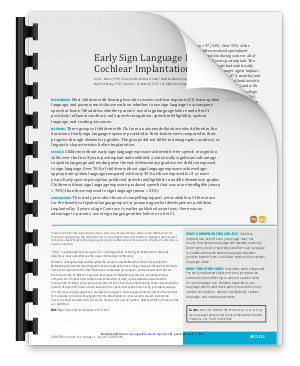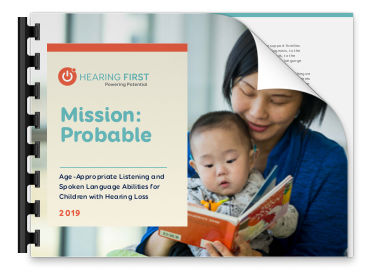
Early sign language exposure and cochlear implantation benefits.
Ann E. Geers, PhD, of the University of Texas at Dallas and colleagues recently completed a study in 2017, comparing the spoken language outcomes of deaf children learning language with or without sign language. Children were included in the study who were defined as having short term, long term and no exposure to sign language. This was based on parent report and no sign language was defined as none used from baseline through the first 3 years following cochlear implant (CI) surgery. Short term sign exposure was defined as sign language use at baseline and/or following 12 months post CI surgery. Long term sign exposure was defined as sign exposure through 36 months post CI surgery.
Overall, a significantly higher portion of children with no exposure to sign language had improved intelligibility of speech compared to those children with both long-term sign exposure and short-term exposure to sign language. Language scores were also significantly different among sign language exposure groups. By late elementary school, children with no sign language exposure had an average language score of 96.2, which was close to the “normative mean” of 100, while mean scores for children with exposure to sign language were lower (83.8 and 76.4 for short- and long-term exposure groups). Spoken language and reading delays continued through early and late elementary school grades (58% in children with short term sign language exposure and 61% in children with long term exposure). The portion of children who experienced continued delay in spoken language and reading dropped significantly during early to late elementary school years in those children with no sign exposure (44% to 29%).
This study truly had some interesting findings but ultimately seemed to yield three takeaway discussions: (1) Children who used spoken language exclusively indicated better auditory speech recognition and more intelligible speech than children whose families used sign language. (2) That spoken language is negatively affected by delaying access to linguistic input. Early exposure to sign did not enhance either spoken language or reading. (3) The quantity of sign exposure directly related to the amount of delay in spoken language and reading outcomes. Children with long term sign exposure were at more disadvantage as compared to children with short term sign exposure.
Geers, A. E., Mitchell, C. M., Warner-Czyz, A., Wang, N. Y., Eisenberg, L. S. & the CDaCI Investigative Team. (2017). Early sign language exposure and cochlear implantation benefits. Pediatrics 140(1) e20163489. doi:10.1542/peds.2016- 3489

